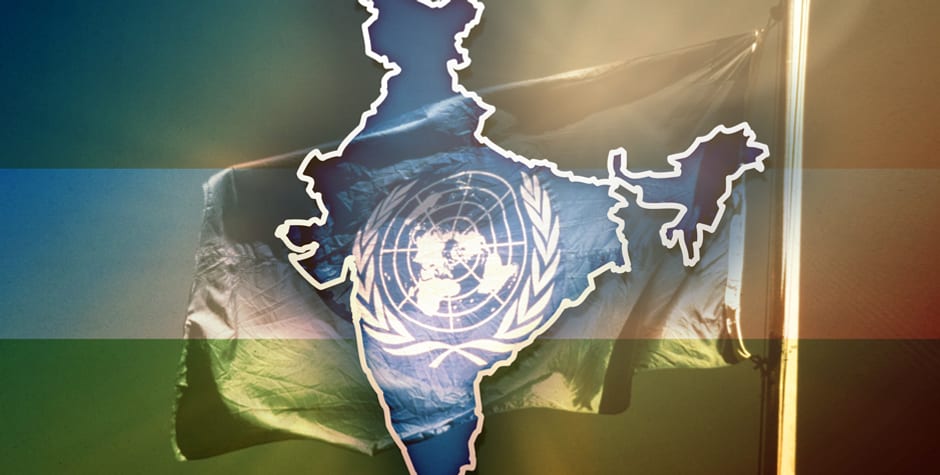Mob Violence and Persecution of Christians Grows Defending Persecuted Christians in India at the United Nations
Persecution of Christians in India continues even as the United Nations Human Rights Council (HRC) reviews the state of human rights in the country during its 48th session.
Just days after we filed a critical report with the HRC, detailing incidents of persecution of Christians by Hindu mobs, another mob of Hindu nationalists attacked a pastor for allegedly converting people to Christianity. This did not happen in a dark alley; the pastor was attacked and beaten inside a police station in Raipur, Chhattisgarh.
Someone filed a complaint with the police station against the pastor alleging he was carrying out a “forcible” religious conversion. Hindu nationalists were reported to arrive at the police station shortly after the complaint was filed. A few members of the Christian community and the pastor came to the police station, and the Hindu mob attacked the pastor and two others. Videos and pictures circulated on the news and social media show the attackers hitting the pastor and the police trying to intervene.
This is not an isolated incident. Our report mentions numerous incidents throughout several states in India that have enacted anti-conversion laws. Our report specifically mentions the anti-conversion law in Chhattisgarh where the above-mentioned pastor was attacked. We stated:
[T]he law in Chhattisgarh—which is similar to other states’ laws—provides that “[n]o person shall convert or attempt to convert, either directly or otherwise, any person from one religious faith to another by the use of force or by allurement or by any fraudulent means nor shall any person abet any such conversion.
While, on its face, this law seems to prohibit forced conversions, in reality it is designed to attack minority faiths. We informed the Council:
[The] definitions of “allurement” and “force” grant authorities vast discretion in prosecution. Under the law, “‘allurement’ means offer of any temptation in form of . . . any gift or gratification . . . [or] grant of any material benefit”, and “force” includes “threat of divine displeasure or social ex-communication”. These broad definitions outlaw many legitimate forms of proselytising—such as offering salvation or preaching repentance.
Under the law, “conversion” does not include returning to an “ancestor’s original religion or [the individual’s] own original religion.” Because of this provision, Hinduism is effectively exempt from the law since it is considered the only “original religion” in India.
In addition to explaining their discriminatory nature and how broad these laws are, we detailed to the Council numerous specific instances of violence against Christians. For instance:
In August 2021, a mob of Hindus vandalised and demolished a church that belonged to the Adivasi community (indigenous people, also called Schedule Tribes) in the village of Telanga Para [in Chhattisgarh]. The mob formed in response to accusations against local Christians of false conversions. In July 2021, another mob of Hindus attacked a house church in Raipur while shouting anti-Christian insults. Rather than arresting the mob, police arrested Firoz Bagh, pastor of the church, based upon allegations of forced conversions.
In another incident in September 2020:
[T]housands of Hindus attacked seventeen Adivasi Christian families in the Kondagaon district in Chhattisgarh. The mob beat the Christian families, looted their belongings, attempted to rape a woman, and expelled the Christians from their homes. The authorities were aware of the impending attack due to the large gatherings of Hindu nationalists who were instigating the mob, but the authorities did not take any action to protect the Christian families.
Persecution of Christians under the anti-conversion laws is not isolated to Chhattisgarh. In the first half of this year, at least 30 incidents of violence and arrests under anti-conversion laws have been reported in Madhya Pradesh and 22 incidents in Uttar Pradesh, among others. Overall, at least 145 cases of violence against Christians in India have been reported just this year.
We reminded the Council that in 2008, the U.N. Special Rapporteur on Freedom of Religion or Belief, Asma Jahangir, stated that anti-conversion laws in India offer legitimacy to those who stir up mob violence. She recommended that these laws be changed. We informed the Council that in the 13 years since the Special Rapporteur’s recommendation, the only thing that has changed is that it is now clear that the laws not only should be changed, they must be repealed.
Finally, we asked the Council to take swift action by calling on India to repeal the anti-conversion laws and ensure that all of India’s citizens can peacefully practice their faith and express their religious beliefs.
